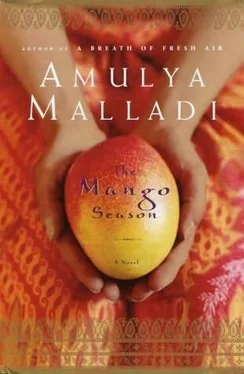“I like the car, I’m not going to fuss over it,” I told him firmly, and Accountant Nick’s eyes went snap-snap open in shock.
And that was that. Nick told me that from now on, when I wanted a new car, I should tell him what I wanted and he would buy it. “Getting conned while buying tomatoes in India is one thing, but when you buy a car it’s criminal to not negotiate,” he said.
But to haggle equated being like my mother and I was never, ever, going to be like my mother.
The mango seller picked out two more mangoes and set them in front of Ma. “Try more. See, they are all the same,” he challenged eagerly, in an attempt to convince her.
Ma ignored the mangoes he chose and pulled out one at random from the basket in question. The man cut a slice off with his knife. Ma tasted the piece of mango and instead of swallowing it, spit it out in the general direction of the ground.
“Eight rupees,” she said, as she wiped her mouth with the edge of her dark blue cotton sari.
“Eight-fifty,” he countered.
“Eight,” she prodded and the man made a “since-you-twist-my-arm” face, giving in to her bargaining skills.
“Okay,” he sighed, then looked at me. “She drives a hard bargain, enh? I am not going to make any money on this sale.”
I made an “I-have-no-say-in-this” face and put the straw basket I was holding in front of him.
“How many kilos?” he asked, and I gasped when my mother said twenty.
How on earth were we, two women with no muscles to speak of, going to carry twenty kilos of mangoes all by ourselves?
I found out soon enough.
It was excruciating. Ma pulled the edge of her sari around her waist and heaved to lift one side of the basket, while I lifted the other. We looked like Laurel and Hardy, tilting the basket, almost losing the goods inside as we paraded down the narrow crowded aisles of Monda Market.
We reached the main road and set the basket down on the dusty pavement. My mother looked at me and shook her head in distaste. “We will have to go home and you will have to change before we go to Ammamma’s. I can’t take you looking like this and we have to take clothes for tomorrow anyway.”
We were all meeting at my grandmother’s house to make mango pickle. It was a yearly ritual and everyone was pleased that I had come to India at the right time. I regretted my decision dearly. If I had to pick a month, it should have been anything but blistering July. I was glad that Nick wasn’t there with me because he would have melted to nothingness in this heat.
I wiped my neck with a handkerchief and stuck it inside my purse. I probably smelled like a dead rat because I felt like one. My body was limp and the sun blazed down at eight in the morning as if in its zenith.
A whole day at my grandmother’s house scared me. The potential for disaster was immense. I had no idea how I was going to tiptoe around the numerous land mines that were most certainly laid out for the family gathering, as always. When I was young it hadn’t mattered much. I used to find a way to block out the bickering and the noise. But now I was an adult and I was expected to join in the bickering and contribute to the noise. I was hardly prepared for either. In addition, I had to break my not-so-good news to one and all-land mines would multiply.
It had just been three days, but I was already tired of being in India, at home, and especially tired of my mother. My father and I got along well, but when it came to taking sides between his children and his wife, Nanna knew which side his idli was smeared with ghee. According to him, Ma was always right.
When Nate and I were younger and fought with Ma, Nanna would always support her. His logic was quite simple: “You will leave someday,” he would say. “She is all I have got and I don’t want to eat at some cheap Udupi restaurant for the rest of my life. She is right and you are wrong-always, end of discussion.”
Calling my mother a nag was not a stretch-she was a super nag. She could nag the hell out of anyone and do it with appalling innocence.
“No autos,” Ma complained airily, and looked at me as if I was somehow to blame for the lack of auto rickshaws. “Why don’t you try and get one,” she ordered, as we stood on the roadside, unhappy in the skin-burning heat, a large basket of mangoes standing slightly lopsided between us on the uneven footpath.
I waved for a while without success. Finally, a yellow and black three-wheeler stopped in front of us, missing by inches my toes that were sticking out of my Kohlapuri slippers.
With her usual panache Ma haggled over the fare with the auto rickshaw driver. They finally decided on twenty-five rupees and we drove home holding the mango basket between us, making sure none of the precious green fruits rolled away.
The road was bumpy and the auto rickshaw moved in mysterious ways. I realized then that I couldn’t drive in India. I would be dead in about five minutes flat. There were no rules; there never had been. You could make a U-turn anywhere, anytime you felt like it. Crossing a red light was not a crime. If a policeman caught you without your driver’s license and registration papers, twenty to fifty rupees would solve your problem.
Everything that had seemed natural just seven years ago seemed unnatural and chaotic compared to what I had been living in and with in the United States.
The breeze was pleasant while the auto rickshaw moved, but the heat and the smell of the mangoes became intolerable when the auto rickshaw stopped at a red signal or for some other reason. There were many “other” reasons: stray cattle on the roads, frequent traffic jams, a couple of Maruti cars parked against each other in the middle of the road as the drivers passionately argued over whose mistake the accident was.
“If Ammamma had only given us mangoes like she did Lata, we wouldn’t have this problem, now would we?” my mother said as the auto rickshaw leaped and jerked over a piece of missing road.
I had heard nothing but this complaint since I got back. My grandmother had given mangoes from the ancestral orchard only to my aunt Lata. This year the harvest had not been good and there weren’t enough mangoes for everyone. My mother was still seething and would probably continue to seethe for the next fifteen years. After all, she was still angry that her wedding sari had cost less than the sari her parents had given their daughter-in-law, Lata, for her wedding.
The battle between Lata and Ma was fought with jibes and remarks. My mother held her head high because my father was the managing director of an electronics company and we lived rather luxuriously compared to Lata. My uncle Jayant was an engineer at BHEL, Bharath Heavy Electronics Limited, a public company where everyone got paid like government officials. Lata and Jayant had a small one-bedroom apartment where they lived with their two young daughters. Ma never ceased to mention how crowded it must be.
My parents had built a large house. They hoped that once my brother and I got married and had children, there would be plenty of room when we came to visit them. But now that I was going to marry an American, I could imagine Ma and Nanna would not want us to visit because then they would be able to avoid the pointed question from neighbors and other family members, “How could you allow this to happen?”
Nate of course could not be counted on to spend much time in my parents’ house once he left for good. Even when I was living in my parents’ house, he was rarely found there. He was now in engineering school in Madras and lived in the university dorm. He came home for the summer but usually found something to do with friends that prevented him from staying at my parents’ house for more than three days in a row.
Читать дальше











